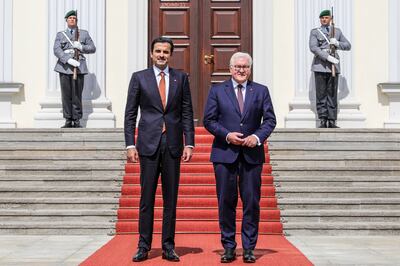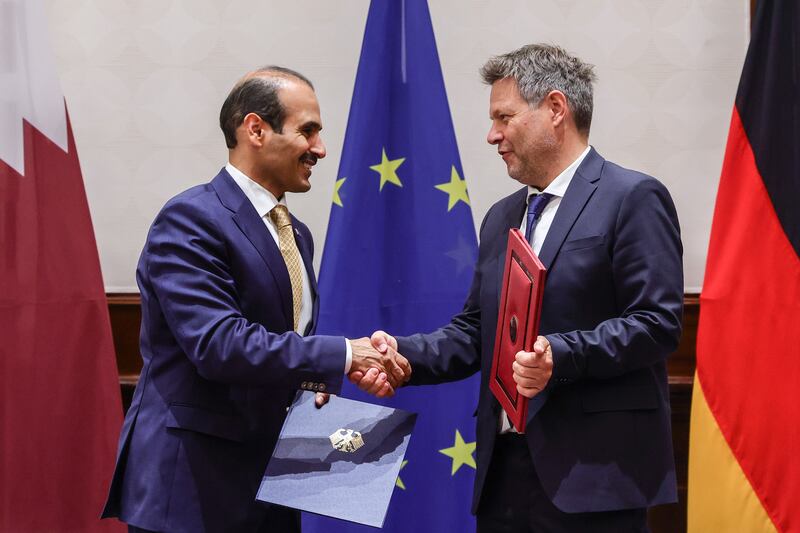Germany on Friday announced an energy pact with Qatar to import liquid gas and work together on developing hydrogen fuel as Europe's biggest economy races to free itself from Russian supplies.
The partnership was signed while Qatar's Emir Sheikh Tamim Al Thani was visiting Berlin to meet Chancellor Olaf Scholz and other officials.
The four-page declaration envisages gas exports from Qatar to Germany and collaboration between scientists from the two countries on hydrogen, energy efficiency and renewables.
No date was given for the first shipments of liquefied natural gas, but Sheikh Tamim told a press conference that "whatever we can provide for energy security in Europe, even during this period, we’ll make sure that we can provide".
"We understand that the energy crisis has been there for a while. It’s got even deeper after the war in Europe but it was also [there] before the war," he said. "We are very happy, very proud that we can also contribute to the stability of the energy market.”
The two countries said they had a shared objective to transform their energy systems to meet the "ambitious efforts" expected of every nation to meet global climate targets.
Gas shipments can begin once Germany, which previously received most of its gas through Russian pipelines, has opened LNG import terminals being built hurriedly on its northern cost.
"It's a big step and Qatar plays an important role in our strategy," Mr Scholz said at the press conference in Berlin.
Qatar's Foreign Minister Sheikh Mohammed bin Abdulrahman Al Thani was quoted by German newspaper Handelsblatt as saying a Qatari-owned plant in the US could start delivering to Germany by 2024.
The two governments also discussed Afghanistan and Iran, with Sheikh Tamim saying he was hopeful that a nuclear deal could be reached between Tehran and world powers and that Qatar was willing to mediate if necessary.
He said Qatar hoped to increase investments in Germany after the two countries said their energy partnership would improve bilateral relations.
Germany has said it can live without Russian oil and coal by the end of this year but will need until 2024 to be independent from Russian gas. Contingency plans have been drawn up in case Moscow cuts off deliveries as it did to Poland and Bulgaria.
Vice Chancellor Robert Habeck visited Qatar in March on a quest for alternative energy sources after Russia invaded Ukraine. He also travelled to the UAE.

Mr Habeck's Economy Ministry said the LNG deal with Qatar was a transitional measure until zero-carbon energy sources can meet Germany's needs. The country is aiming for carbon neutrality by 2045.
"Both countries, having just overcome the worst of the Covid pandemic, are now facing Putin's war of aggression against Ukraine with all its dreadful consequences," said Germany's ambassador in Qatar Claudius Fischbach, in comments carried by the Qatar News Agency.
The European Union has high hopes for hydrogen and Germany hopes eventually to convert its LNG terminals into infrastructure to handle that fuel source.
Officials in Mr Habeck's department have said Germany cannot allow itself to become as reliant on any country as it was on Russia before the invasion. The EU also plans to import LNG from America.







